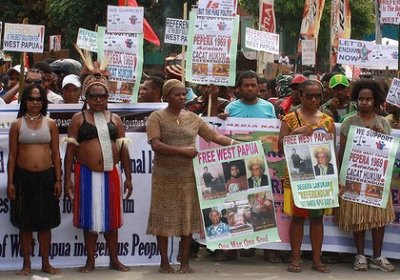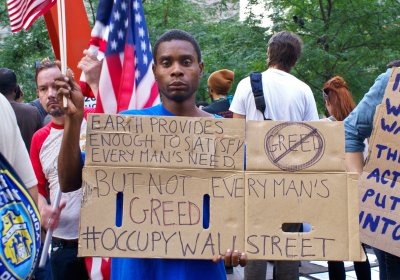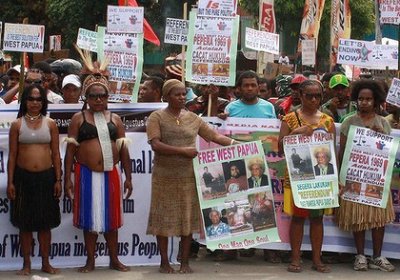Strike action by thousands of workers at the notorious Grasberg gold and copper mine in West Papua since September 15 has brought operations to a halt, despite attempts to stop the strike.
The mine is the largest and most profitable in territory controlled by Indonesia and has a long association with human rights abuses. It is owned by US mining giant Freeport-McMoRan and British-Australian company Rio Tinto.
West Papua has been occupied by Indonesia for nearly five decades, despite strong demands from Papuans for self-determination.
Ash Pemberton
Some conservative commentators have declared the global Occupy movement to be “socialist”. Right-wing activist and musician Ted Nugent said in the Washington Times on October 14: “Occupy Wall Street is nothing more than anti-American socialism on parade...
“These useful idiots are clamoring for social justice, as if they don’t have enough of that already.”
The latest wave of the bloodshed that has taken place in Yemen since September 18 shows the country’s hated President, Ali Abdullah Saleh, has no intention of leaving power peacefully.
At least 35 people were killed and many more were wounded in government attempts to crack down on protesters between October 15 and 18, The Guardian said on October 18.
Government forces also battled tribal fighters and defected soldiers loyal to anti-Saleh political forces.
Indonesian army forces brutally attacked the Papuan national conference in Abepura on October 19. The conference was attended by up to 20,000 people discussing West Papua's struggle for independence from Indonesia.
WestPapuaMedia.info said on October 21 that local sources confirmed six people were killed. New Matilda.com reported on October 20 an account from a priest who saw a truck full of arrested people who were “covered with blood” and had been “beaten and shot”.
More than 3000 people turned out on October 16 to walk across the Sea Cliff Bridge in the Illawarra in protest against coal seam gas mining plans in the area. The protest was further proof the coal seam gas (CSG) industry is in trouble. Its problem? An informed public.
The Australian said on October 10 that a survey had showed the CSG industry was “losing the PR battle”, with 63% of respondents recalling a negative media story about CSG.
Driving the bad coverage has been the large grassroots campaign against the industry.
Pro-democracy protesters in Bahrain have gone on the offensive in the face of government repression and harsh sentences for activists arrested in the first wave of protests in February and March.
Large protests began on September 23 against sham by-elections for Bahrain’s toothless parliament. Most people heeded the democracy movement’s call for a boycott — only about 17% turned out to vote, FT.com said on September 25.
Police blocked attempts by protesters to reach the previous epicentre of the protests — the now-demolished Pearl Roundabout, known as Martyr’s Square by protesters.
A vote on the Labor government’s harsh proposed changes to Australia’s migration laws was postponed until October 11, after parliament failed to vote on them on September 22.
This followed a bizarre twist in the farcical refugee debate on September 19 when new laws were passed increasing refugee protection at the same time as the government pushed forward with its plans to expel refugees to Malaysia.
A 20-hour assault on the US embassy in Kabul by Taliban fighters on September 14 has exposed further weaknesses in the already-crumbling facade of the United States-led occupation of Afghanistan.
The Taliban launched a sustained rocket attack on what is supposedly the most secure area in the country, seriously embarrassing Western officials who continue to insist “progress” is being made.
While the mainstream media have focused on the fall of Muammar Gaddafi's regime in Libya, democracy movements in Yemen, Syria and Bahrain have deepened despite severe repression.
Hundreds of thousands of people rallied in Yemen's capital Sana'a on September 4, MorningStarOnline.co.uk said the next day. They demanded the removal of President Ali Abdullah Saleh.
Thousands were prevented from rallying by military roadblocks. Five protesters were wounded when government troops opened fire on the rally.
As Libyan dictator Muammar Gaddafi's regime crumbled on August 23 after a rebel uprising and NATO bombing, United States President Barack Obama said: "For over four decades, the Libyan people had lived under the rule of a tyrant who denied them their most basic human rights."
Obama would know ― his government's support in recent years allowed Gaddafi's regime to do so. Indeed, the NATO bombing campaign targeted Libyan forces the US had armed and trained.
The new government of Papua New Guinea, led by prime minister Peter O'Neill, has announced plans to revert ownership of minerals and resources to traditional landowners.
Mining minister Byron Chan said in a speech on August 11 the government would seek to give traditional owners legal ownership of resources under the land and sea.
Currently, the PNG government owns anything more than six feet under the surface.
Chan also promised an urgent review of mining and environmental laws, especially those involving deep sea mining.
A leaked report from the notorious Indonesian special forces unit Kopassus detailing information about the West Papuan independence movement has drawn attention to Indonesia's brutal occupation of the region.
The report is titled “Anatomy of Papuan Separatists” and is believed to have been written in 2009. It profiles opponents of Indonesian rule, including political activists and guerilla fighters.
It also listed foreign politicians and journalists who supported Papuan liberation.
- Previous page
- Page 5
- Next page








